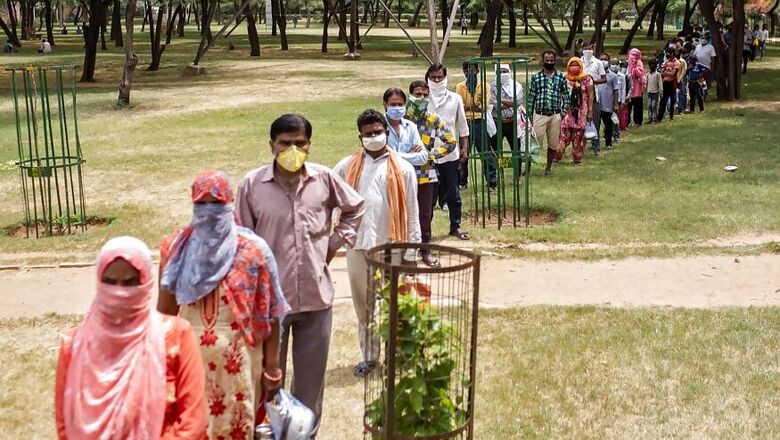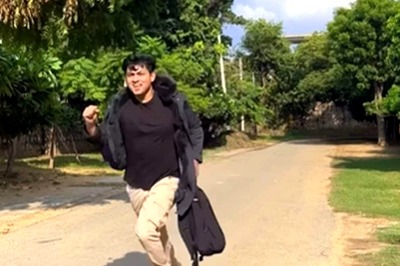
views
New Delhi: The extension of the nationwide lockdown, from the initial 21 days to at least 40 days, is multiplying the miseries of India’s vast migrant population. These were people who were working in states other than their home state and were suddenly left high and dry as the nation went into a total lockdown on March 24.
Some trudged unimaginable distances on foot – in the absence of any transport – to reach homes as their jobs were gone and roofs over their head snatched away. But most have since been stranded thousands of miles from their homes, with little access to food and medicine and almost no money to buy rations.
While there is little official data on the number of migrants in India, the government told the Supreme Court last month that nearly six lakh such people were stranded in various government shelters. Economists and workers on the field now say that hunger is increasing among the stranded people and they need a more robust response from the government. In a relief package announced late last month, Finance Minister Nirmala Sitharaman had promised free foodgrain to the needy through the Public Distribution System (PDS), some cash transfer through the existing Jan Dhan accounts and a few other measures to help those in need.
But bureaucratic glitches and the inability of a significant number of the weaker sections in becoming eligible for government dole has meant that the troubles of the poor and the stranded migrants are only growing. Experts are now suggesting that in order to ensure that no one stays hungry, the government should make access to foodgrain and some other essential items universal, even if for a short period. Foodgrain and other essential commodities should be available to anyone in need through the PDS.
The Stranded Workers in Action (SWA) network, which claims to have interacted with over 11,000 such stranded migrants since the lockdown started, has noted that with each passing day of the lockdown period, the number of distress calls has increased. SWA said in a report that the livelihood crisis is already estimated to impact at least 12 crore people and in order to ensure food security, the government should provide free PDS ration for three months, in advance.
“Double the PDS ration for three months (April, May, June) and provide it free in advance through doorstep delivery along with cooking oil, pulses, salt, masala, sanitary pads and soap to be distributed in advance to all," said the SWA.
It added there is an urgent need at this moment to universalise access to food grains, pulses, cooking oil and soap, and provide it to everyone desirous of obtaining these, irrespective of whether they have a ration card or not, because a lot of the very poor, including the homeless and circular migrants in cities have no cards.
The universalisation of access to food in the times of the Covid-19 pandemic is a demand which other social sector workers and economists are also making. In a joint piece in the Indian Express newspaper on Thursday, renowned economists Amartya Sen, Raghuram Rajan and Abhijit Banerjee also sought universal access to food, besides asking the government to temporarily shed its fear of leakages.
The trio said the biggest worry right now was that a huge number of people will be pushed into dire poverty or even starvation by the combination of the loss of their livelihoods and interruptions in the standard delivery mechanisms. The economists have suggested that since a “substantial” fraction of the poor are excluded from the government’s existing public distribution network (PDS), government’s latest move to provide extra foodgrain for free for a short period will not be enough nor will it cover all the hungry.
“The correct response is to issue temporary ration cards — perhaps for six months — with minimal checks to everyone who wants one and is willing to stand in line to collect their card and their monthly allocations. The cost of missing many of those who are in dire need vastly exceeds the social cost of letting in some who could perhaps do without it,” the three economists suggested.
Another organisation working in the hinterland, the Right to Food Campaign (RFC), has also joined the chorus for making access to food universal. It has put the number of people who do not have access to ration cards (and hence the PDS) at a whopping nine crore. Some other experts, including Jean Dreze, have pegged this figure at 10 crore.
In a letter to Ram Vilas Paswan, Minister of Consumer Affairs, Food and Public Distribution, RFC has said, “We appeal to you to urgently make the availability of rations under PDS universal in such a manner that any person/household that approaches a fair price shop (FPS) can get a package of grains, pulses and cooking oil to avoid widespread hunger and starvation. The national lockdown that was imposed has resulted in the loss of livelihoods to millions of poor and working people across the country."
It added that it had received reports of widespread hunger from urban and rural areas across the country, and also starvation deaths in Bihar, Hyderabad, Jharkhand, Karnataka, and Uttar Pradesh.
"Supply chains were broken and access to markets has also become more difficult. Despite administrative measures, food inflation and spiralling prices of even essential items are with us to stay,” the letter said.
This morning, Uttar Pradesh Chief Minister Adityanath has asked officials to provide foodgrain to anyone in need, regardless of whether they have ration cards or not.
Nonetheless, the suggestion that the government should ignore concerns over leakages in the PDS and provide food to anyone in need, comes alongside another one on cash transfers. Opposition parties have recommended that the first tranche of cash transfers – from Rs 5,000 to higher amounts – be made in Jan Dhan accounts so that the needy can at least tide over the next few months.



















Comments
0 comment